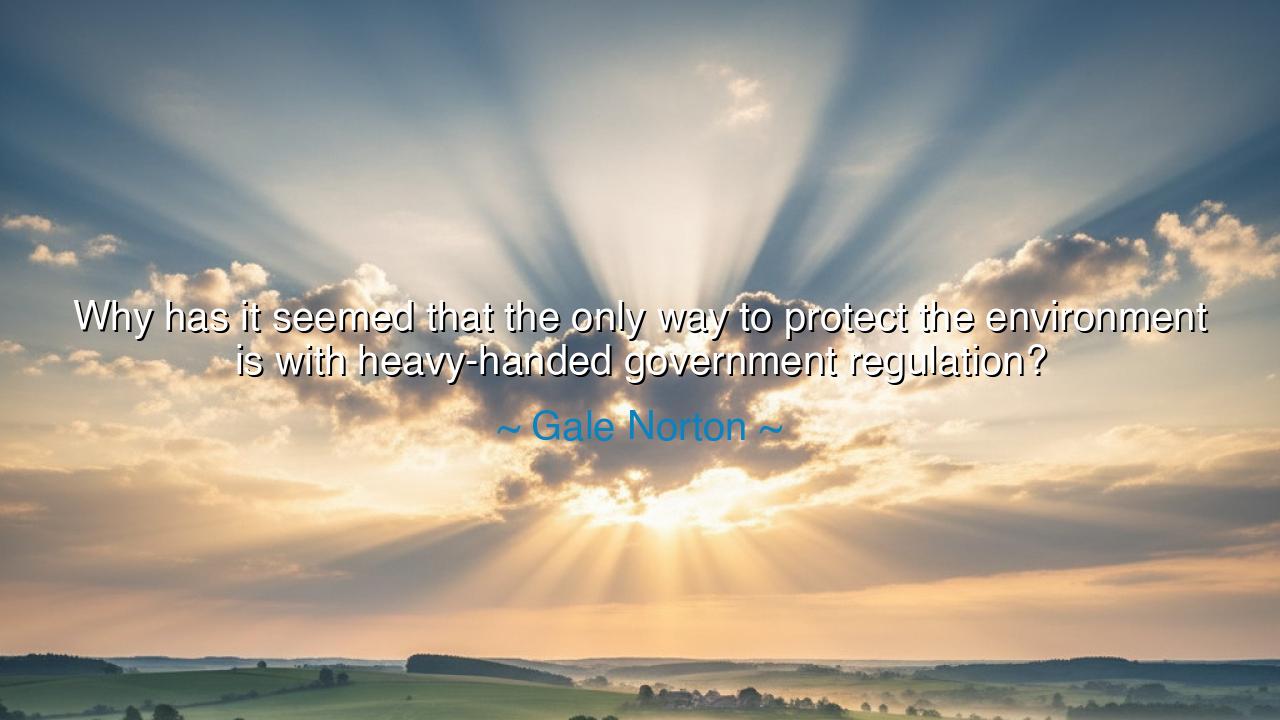
Why has it seemed that the only way to protect the environment is
Why has it seemed that the only way to protect the environment is with heavy-handed government regulation?






“Why has it seemed that the only way to protect the environment is with heavy-handed government regulation?” Thus spoke Gale Norton, a voice questioning not the value of protection, but the means by which it is achieved. Her words echo through the chambers of public thought like the challenge of a philosopher, daring the people to look beyond habit and fear. For she does not ask why the environment should be protected — that truth is sacred and self-evident — but why we have come to believe that only the arm of government, and a heavy hand at that, can do the guarding. Her question is both a critique and a calling: to seek a nobler balance between freedom and stewardship, between law and conscience, between the ruler’s decree and the citizen’s will.
From the dawn of nations, humankind has wrestled with the care of the earth. The soil beneath our feet, the rivers that wind like veins through the land, the breath of the air itself — these are the foundations of life, not possessions to be consumed. Yet through the ages, we have often treated them as mere tools of profit. Out of such recklessness rose the need for regulation, and thus the state became the custodian of what the people neglected. But Norton’s question pierces deeper: must we forever rely upon command and punishment to do what the heart already knows is right? Can there not be a world where responsibility is born within, rather than enforced from above?
The modern age has seen both triumph and tragedy in this realm. In the twentieth century, rivers burned with pollution and the skies dimmed with smoke. In those dark days, it was indeed the government’s strong hand that stemmed the tide — laws like the Clean Air Act and the establishment of national parks preserved what greed would have devoured. Yet, as generations passed, the question arose anew: had the people grown more mindful, or merely more obedient? Had regulation awakened conscience, or replaced it? Norton, in her wisdom, warned that regulation alone cannot save the earth, for rules without reverence are but cages around corruption.
Consider the tale of Theodore Roosevelt, the Rough Rider turned conservationist, who beheld the wilderness with awe and vowed to preserve it. He did not protect the land through bureaucracy alone, but through vision — he inspired a nation to see forests not as lumber but as legacy. His acts were bold, but his spirit was deeper still: he taught that the defense of nature must come from both leadership and love. For laws may protect trees, but only hearts can plant them. The true guardian of the earth is not the regulator, but the responsible soul who acts from gratitude, not fear.
Norton’s words, then, are not rebellion against protection, but a plea for wisdom. She speaks to a people grown too dependent on law and too estranged from virtue. Heavy-handed government regulation, she warns, can breed resentment where there should be reverence, and compliance without conviction. It can make citizens see the earth not as a trust to honor, but as a set of limits to endure. Her vision is one of shared stewardship — where government leads with guidance, but the people follow with purpose; where communities, companies, and individuals take ownership of the sacred duty to preserve creation.
The balance she seeks is delicate, but divine. For freedom without care leads to ruin, yet control without trust leads to tyranny. The wise must walk the middle path, where conscience governs more strongly than law, and love for the land inspires more deeply than fear of fines. The future of the earth will not be written in statutes alone, but in the quiet choices of daily life — the farmer who tends his soil with humility, the builder who spares the forest, the citizen who plants a tree knowing she may never sit beneath its shade.
Let this be the lesson of her words: the protection of the earth begins not in regulation, but in reverence. Governments may set boundaries, but it is the people who must set their hearts. Each of us must learn again the old truth that the earth is not a commodity, but a covenant. Honor it not because law commands you, but because gratitude moves you. When that spirit awakens in the multitude, laws may soften, for duty will live in every hand and every home.
Thus, O listener, let not your care for the earth be forced, but chosen. Take stewardship as both freedom and faith. For the day the people act from love rather than fear, the balance will be struck — and the world will know the harmony that neither government nor greed could ever achieve alone. Protect not because you must, but because the earth is part of your own soul.






AAdministratorAdministrator
Welcome, honored guests. Please leave a comment, we will respond soon